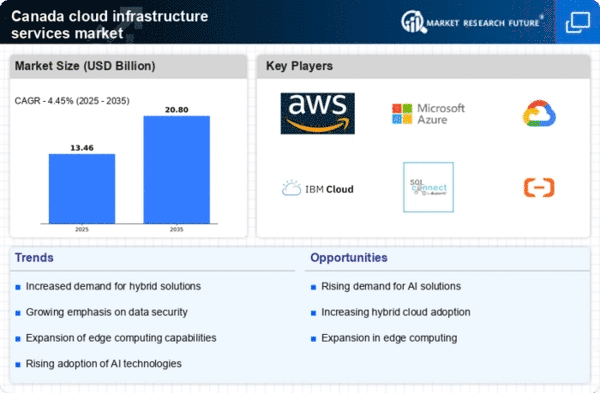Growing Demand for Scalability
The is witnessing a notable surge in demand for Businesses increasingly seek flexibility to adjust their resources based on fluctuating needs. This trend is particularly pronounced among small to medium-sized enterprises (SMEs) that require cost-effective solutions without compromising performance. According to recent data, approximately 70% of Canadian SMEs are expected to adopt cloud services by 2026, driven by the need for scalability. This growing demand for scalable infrastructure is reshaping the cloud infrastructure-services market, as providers enhance their offerings to accommodate diverse business requirements. The ability to scale resources up or down efficiently allows organizations to optimize costs and improve operational efficiency, thereby fostering a more dynamic business environment.
Rise of Data-Driven Decision Making
In the cloud infrastructure-services market, the rise of data-driven decision making is a pivotal driver. Organizations in Canada are increasingly leveraging cloud-based analytics tools to derive insights from vast amounts of data. This trend is supported by the fact that over 60% of Canadian businesses are investing in data analytics capabilities, which are often hosted on cloud platforms. The ability to analyze data in real-time enhances operational efficiency and informs strategic decisions. Consequently, cloud service providers are focusing on integrating advanced analytics and machine learning capabilities into their offerings. This shift not only empowers businesses to make informed decisions but also positions the cloud infrastructure-services market as a critical enabler of innovation and competitive advantage.
Regulatory Compliance and Data Sovereignty
Regulatory compliance and data sovereignty are increasingly shaping the cloud infrastructure-services market in Canada. Organizations are compelled to adhere to stringent regulations regarding data protection and privacy, such as the Personal Information Protection and Electronic Documents Act (PIPEDA). This regulatory landscape drives businesses to seek cloud solutions that ensure compliance while maintaining data sovereignty. Approximately 40% of Canadian organizations prioritize local data storage to meet regulatory requirements. Consequently, cloud service providers are adapting their offerings to align with these compliance needs, which may include localized data centers and enhanced security measures. This focus on regulatory compliance not only influences purchasing decisions but also reinforces the importance of the cloud infrastructure-services market in supporting businesses' legal obligations.
Increased Focus on Disaster Recovery Solutions
The cloud infrastructure-services market in Canada is witnessing an increased focus on disaster recovery solutions. Organizations are recognizing the importance of robust backup and recovery systems to safeguard their data against potential threats. Recent statistics indicate that nearly 50% of Canadian businesses have experienced data loss incidents, prompting a shift towards cloud-based disaster recovery services. This trend is likely to drive investments in cloud infrastructure, as companies seek reliable solutions to ensure business continuity. Providers are responding by enhancing their disaster recovery offerings, which include automated backups and failover capabilities. As a result, the cloud infrastructure-services market is evolving to meet the growing demand for comprehensive disaster recovery solutions, thereby reinforcing its critical role in organizational resilience.
Expansion of Internet of Things (IoT) Applications
The cloud infrastructure-services market is significantly influenced by the expansion of Internet of Things (IoT) applications in Canada. As more devices become interconnected, the demand for cloud services to manage and analyze IoT data is escalating. Current estimates suggest that the number of connected IoT devices in Canada could reach 1 billion by 2027, creating a substantial need for cloud infrastructure to support data storage and processing. This trend is prompting cloud service providers to develop specialized solutions tailored for IoT applications, including edge computing capabilities. The integration of IoT with cloud services not only enhances operational efficiency but also opens new avenues for innovation within the cloud infrastructure-services market.
















